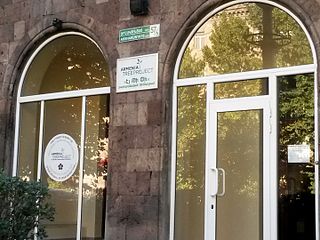 W
WArmenia Tree Project (ATP) is a non-profit organization based in Watertown, Massachusetts, United States, and Yerevan, Armenia, founded in 1994 by Carolyn Mugar to promote Armenia's socioeconomic development through reforestation. Since its founding, the organization has planted more than 6.5 million trees in communities throughout Armenia.
 W
WAsian Forest Cooperation Organization is an intergovernmental organization in Asia aiming to strengthen forest cooperation by transforming proven technology and policies into concrete actions in the context of sustainable forest management to address the impact of climate change.
 W
WAvoided Deforestation Partners, or AD Partners, is a non-profit organization under the auspices of the Center for International Policy in Washington, D.C. AD Partners is involved in the global effort to solve climate change by working to end deforestation in tropical rainforest countries. By avoiding the practice of deforestation, i.e., clearing forests to provide inexpensive farmland, the world gains the significant climate benefits of not releasing carbon into the atmosphere. In addition, avoiding deforestation also allows forests to sequester carbon and scrub the air of pollutants. Beyond protecting our air quality, tropical forests create the conditions for rain, recharge our water sources, provide habitats for myriad plant and animal species, and support a way of life for 1.6 billion forest dependent people. Leading scientists and economists say that ending deforestation is the most cost effective and scalable method of reducing greenhouse gases. In fact, they believe that ending deforestation will cut the timeframe for solving the climate crisis in half.
 W
WThe Center for International Forestry Research (CIFOR) is a non-profit scientific research organization that conducts research on the use and management of forests with a focus on tropical forests in developing countries. CIFOR is the forestry research center of the Consultative Group on International Agricultural Research (CGIAR), a network of 15 research centers around the world that focus on agricultural research for sustainable development, working closely with governments and other partners to help develop evidence-based solutions to problems related to sustainable agriculture and natural resource management.
 W
WThe United Nations Forum on Forests (UNFF) is a high-level intergovernmental policy forum. The forum includes all United Nations member states and permanent observers, the UNFF Secretariat, the Collaborative Partnership on Forests, Regional Organizations and Processes and Major Groups.
 W
WConservation International (CI) is an American nonprofit environmental organization headquartered in Crystal City, Arlington, Virginia. Its mission is to spotlight and secure the critical benefits that nature provides to humanity, such as food, fresh water, livelihoods and a stable climate.
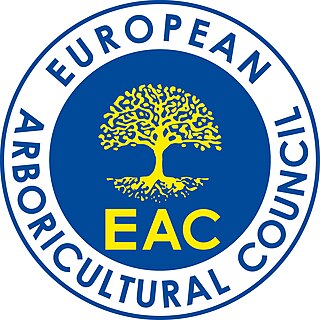 W
WThe European Arboricultural Council (EAC) based in Bad Honnef, Germany is a forum where delegates from a wide range of arboricultural organizations throughout Europe meet. The goal of the EAC is to elevate the status and to raise the professional level of competence within arboriculture. This objective is carried out by liaising on matters ranging from research and education to successful tree establishment and the improvement of safe working practices.
 W
WForest Peoples Programme (FPP) advocates an alternative vision of how forests should be managed and controlled, based on respect for the rights of the peoples who know them best. FPP works with forest peoples in South America, Africa, and Asia, to help them secure their rights, build up their own organisations and negotiate with governments and companies as to how economic development and conservation are best achieved on their lands.
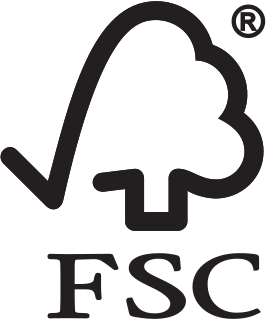 W
WThe Forest Stewardship Council (FSC) is an international non-profit, multistakeholder organization established in 1993 that promotes responsible management of the world's forests. It is an example of a market-based certification program used as a transnational environmental policy.
 W
WForests Monitor is a non-governmental organization that was established in Cambridge, England, in 1993, to support forest-dependent people and raise public awareness about the negative impact that industrial forest exploitation has on the people that live in these forests and on the ecosystems that support them, including the wide range of plants and animals. Their aim is to provide detailed research on forestry companies and their activities to NGOs and interested citizen's groups, and so support and empower those people affected by bad practices. Forests Monitor is a non-profit, non-governmental organisation.
 W
WThe Foundation for Environmental Education (FEE) is a non-governmental, non-profit organisation promoting sustainable development through environmental education. FEE is active through five programmes; Blue Flag, Eco-Schools, Young Reporters for the Environment (YRE), Learning about Forests (LEAF) and Green Key International. It has members in 77 countries worldwide.
 W
WIllegal logging is the harvest, transportation, purchase or sale of timber in violation of laws. The harvesting procedure itself may be illegal, including using corrupt means to gain access to forests; extraction without permission, or from a protected area; the cutting down of protected species; or the extraction of timber in excess of agreed limits. Illegal logging is a driving force for a number of environmental issues suchh as deforestation, soil erosion and biodiversity loss which can drive larger scale environmental crisis such as climate change and other forms of environmental degradation.
 W
WThe International Analog Forestry Network (IAFN) is a non-governmental organization (NGO) that seeks to conserve and restore biodiversity worldwide through the application of analog forestry. The IAFN links a variety of community, governmental, and private organizations, as well as a number of individuals, who apply the practices and principles of analog forestry in their work.
 W
WThe International Forestry Students’ Association or IFSA is one of the largest international networks of students in forestry and related sciences. IFSA is a globally organized and locally operating students’ organization connecting forest and related science students to their peers and forest-related organizations and policy platforms.
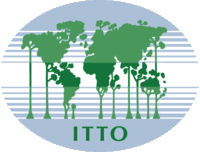 W
WThe International Tropical Timber Organization (ITTO) is an intergovernmental organization that promotes conservation of tropical forest resources and their sustainable management, use and trade.
 W
WThe International Union for Conservation of Nature is an international organization working in the field of nature conservation and sustainable use of natural resources. It is involved in data gathering and analysis, research, field projects, advocacy, and education. IUCN's mission is to "influence, encourage and assist societies throughout the world to conserve nature and to ensure that any use of natural resources is equitable and ecologically sustainable".
 W
WThe International Union of Forest Research Organizations (IUFRO) is a non-profit, non-governmental international network of forest scientists, headquartered in Austria.The aim of the organization is to promote worldwide cooperation in scientific studies embracing the whole field of research related to forests and their use and sustainable development. In 2019 IUFRO counted 630 Member Organizations worldwide.
 W
WThe Plant A Tree Today Foundation (PATT) is a non-governmental environmental organization with primary operations in the United Kingdom and Thailand. Established in 2005, PATT attempts to raise environmental awareness and foster better practices in less developed nations around the world, planting trees as a means to combat deforestation and climate change.
 W
WRainforest Action Network (RAN) is an environmental organization based in San Francisco, California, United States. The organization was founded by Randy "Hurricane" Hayes and Mike Roselle in 1985, and first gained national prominence with a grassroots organizing campaign that in 1987 succeeded in convincing Burger King to cancel $31 million worth of destructive Central American rainforest beef contracts. Protecting forests and challenging corporate power has remained a key focus of RAN’s campaigns since, and has led RAN into campaigns that have led to transformative policy changes across home building, wood purchasing and supplying, automobile, fashion, paper and banking industries.
 W
WThe Rainforest Alliance is an international non-governmental organization (NGO) based in New York City and Amsterdam, with operations in more than 60 countries. It was founded in 1987 by Daniel Katz, an American environmental activist, who serves as the Chair of the board of directors. Its main work is the provision of an environmental certification for sustainability in forestry, agriculture, and tourism. Its certificate seal gives information to consumers about business practices, based on certain standards they set.
 W
WThe Rainforest Foundation Fund is a charitable foundation founded in 1987 and dedicated to drawing attention to rainforests and defending the rights of indigenous peoples living there.
 W
WResource Extraction Monitoring (REM) is a non-profit organisation that provides independent monitoring to ensure that laws relating to the extraction of natural resources are enforced. It was founded in 2003 by experts with over 15 years of monitoring experience. The head office is in the UK, with local offices in countries where major projects are taking place.
 W
WThe Roundtable on Sustainable Palm Oil (RSPO) was established in 2004 with the objective of promoting the growth and use of sustainable palm oil products through global standards and multistakeholder governance. The seat of the association is in Zurich, Switzerland, while the secretariat is currently based in Kuala Lumpur, with a satellite office in Jakarta. RSPO currently has 4,706 members from 94 countries.
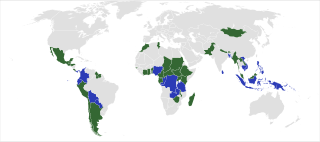 W
WThe United Nations Programme on Reducing Emissions from Deforestation and Forest Degradation is a collaborative programme of the Food and Agriculture Organization of the United Nations (FAO), the United Nations Development Programme (UNDP) and the United Nations Environment Programme (UNEP), created in 2008 in response to the UNFCCC decisions on the Bali Action Plan and REDD at COP-13. It should not be confused with REDD+, a voluntary climate change mitigation approach that has been developed by Parties to the UNFCCC.
 W
WThe United Nations Forum on Forests (UNFF) is a high-level intergovernmental policy forum. The forum includes all United Nations member states and permanent observers, the UNFF Secretariat, the Collaborative Partnership on Forests, Regional Organizations and Processes and Major Groups.